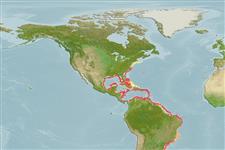>
Eupercaria/misc (Various families in series Eupercaria) >
Lutjanidae (Snappers) > Lutjaninae
Etymology: Lutjanus: Malay, ikan lutjan, name of a fish.
More on author: Cuvier.
Environment: milieu / climate zone / depth range / distribution range
Ecologia
marino associati a barriera corallina; distribuzione batimetrica 90 - 242 m, usually 90 - 140 m (Ref. 55). Subtropical; 41°N - 30°S, 99°W - 32°W (Ref. 55)
Western Atlantic: North Carolina, USA and Bermuda to São Paulo, Brazil (Ref. 57756). Most abundant around the Antilles and the Bahamas.
Length at first maturity / Size / Peso / Age
Maturity: Lm 41.6, range 24 - 26 cm
Max length : 83.0 cm TL maschio/sesso non determinato; (Ref. 40637); common length : 45.0 cm TL maschio/sesso non determinato; (Ref. 55); peso massimo pubblicato: 8.3 kg (Ref. 4699)
Spine dorsali (totale) : 10 - 11; Raggi dorsali molli (totale) : 13 - 14; Spine anali: 3; Raggi anali molli: 7 - 8. Preopercular notch and knob weak. Pectoral fins long reaching level of anus. Scale rows on back rising obliquely above lateral line. Back and upper sides pink to red, grading to pink with a silvery sheen ventrally; sides with very fine undulating yellow lines; the fins mostly reddish or pale yellow. Young specimens (under about 25 cm) with a blackish spot on upper side below anterior dorsal soft rays.
Adults are common near the edge of the continental and island shelves; also found in deeper waters (below 200 m); usually ascending to shallow water at night. They feed mainly on fishes, shrimps, crabs, gastropods, cephalopods, tunicates and some pelagic items including urochordates. Marketed fresh. Said to be a good food fish (Ref. 5521).
Life cycle and mating behavior
Maturities | Riproduzione | Spawnings | Egg(s) | Fecundities | Larve
Spawning occurs over most of the year in lower latitudes, but is seasonal (spring and summer) toward the northern and southern limits of the distribution.
Allen, G.R., 1985. FAO Species Catalogue. Vol. 6. Snappers of the world. An annotated and illustrated catalogue of lutjanid species known to date. FAO Fish. Synop. 125(6):208 p. Rome: FAO. (Ref. 55)
IUCN Red List Status (Ref. 130435)
Threat to humans
Reports of ciguatera poisoning (Ref. 55)
Human uses
Pesca: commerciale; Pesce da pesca sportiva: si
Strumenti
Special reports
Download XML
Fonti Internet
Estimates based on models
Preferred temperature (Ref.
123201): 17.3 - 25.2, mean 21.2 °C (based on 73 cells).
Phylogenetic diversity index (Ref.
82804): PD
50 = 0.5000 [Uniqueness, from 0.5 = low to 2.0 = high].
Bayesian length-weight: a=0.01479 (0.01305 - 0.01676), b=2.97 (2.94 - 3.00), in cm total length, based on LWR estimates for this species (Ref.
93245).
Trophic level (Ref.
69278): 3.1 ±0.5 se; based on diet studies.
Generation time: 11.0 ( na - na) years. Estimated as median ln(3)/K based on 2
growth studies.
Resilienza (Ref.
120179): Basso, tempo minimo di raddoppiamento della popolazione 4.5 - 14 anni (K=0.09-0.32; tm=5).
Prior r = 0.28, 95% CL = 0.19 - 0.43, Based on 2 data-limited stock assessments.
Fishing Vulnerability (Ref.
59153): Moderate vulnerability (37 of 100).
Nutrients (Ref.
124155): Calcium = 14 [7, 23] mg/100g; Iron = 0.283 [0.165, 0.486] mg/100g; Protein = 18.7 [17.2, 20.2] %; Omega3 = 0.178 [0.106, 0.300] g/100g; Selenium = 43.5 [22.3, 82.9] μg/100g; VitaminA = 65.2 [11.3, 329.9] μg/100g; Zinc = 0.326 [0.234, 0.494] mg/100g (wet weight);
